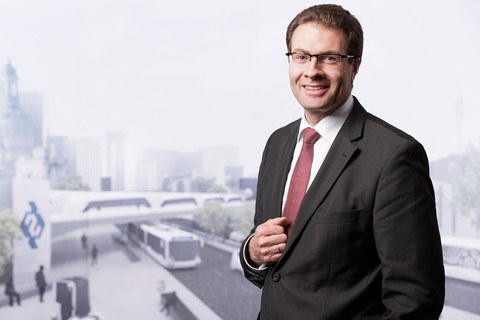Portrait of Professor Leyens
Prof. Dr.-Ing. Christoph Leyens has held the Chair of Materials Technology since November 2009 and has been Director of the Institute of Materials Science since 2011. From 2009 to 2016, he was Vice-Dean of the Faculty of Mechanical Science and Engineering. He has also headed the Fraunhofer Institute for Material and Beam Technology IWS Dresden since October 2018. He was born in Oldenburg (i. Oldg.) in 1967.
Without materials technology ... our modern life would be unthinkable. Materials are important drivers of innovation and yet they often remain hidden. This is mainly due to the strong fascination with products. When we take off on vacation in a new plane, very few of us think about the fact that it is the tailor-made materials that make flying safe, comfortable and affordable. The task of materials engineering is to use fundamental materials research to develop technologies that can be used to manufacture products for all conceivable areas of application.
For me,being a professor ... means the daily challenge of providing lively teaching enriched by the latest research findings. It is precisely this stimulating interplay that takes a lot of energy, but is also a lot of fun.
Students ... should use their university education to mature professionally and personally. The TU Dresden offers an unbeatable number of opportunities to further your professional education and at the same time think outside the box. For those who understand this, TU Dresden serves as a springboard for their own further development.
The future... can be shaped together. The Faculty of Mechanical Science and Engineering is well equipped for the major challenges of the coming years. It is important to maintain the quality of research and teaching at the highest level, even under changed framework conditions. Together, the members of the faculty will do everything in their power to achieve this goal.
If I could study again ... I would choose a second degree in the natural sciences, probably biology. The most exciting areas of research today lie between the classic disciplines, where Material Science and Biology meet, for example. Technology can still learn a lot from nature and, in my opinion, bionic materials and structural principles have considerable development potential. In addition, nature has developed information systems and self-healing mechanisms that we would also like to see in technical products. Such intelligent material systems of the future will benefit transportation technology just as much as energy technology and general mechanical engineering.
For me, excellence... means the ability to develop. In research, this means keeping up with the competition of the brightest researchers and constantly measuring yourself against them. In teaching, in my view, excellence means training people at all levels - from undergraduates to doctoral students or post-doctoral students - who are outstanding in their subject and still retain an eye for the big picture.

